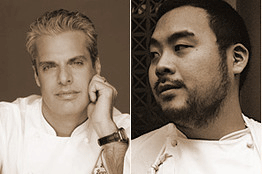
What is Buddhist cuisine? That was the question at hand during a conversation between chefs Eric Ripert and David Chang at the Rubin Museum of Art Friday night.
In a panel hosted by Luckyrice’s Restaurant Week and moderated by the Rubin’s Tim McHenry, who was filling in for Buddhist professor Dr. Robert Thurman and referred to himself as “tofu” to Thurman’s “Kobe beef,” the three men didn’t reach any definitive conclusions, but did come to consensus that all ingredients must be treated with respect and compassion, and with meat products, all animals must face as little suffering as possible when being killed.
Ripert, who runs the four-star Le Bernardin in Manhattan, noted that as a Buddhist, he often felt conflicted about running a fish restaurant, and emphasized the important of finding a middle road.
He said that it was important for the fish he served not to have suffered when they were raised or caught, and that everyone had to be proactive in terms of promoting sustainability, such as only using fish that were caught by processes that didn’t disturb the world’s seabeds.
A Buddhist since buying a book about the religion at the Charles de Gaulle Airport on his way to America for the first time, Ripert said he truly believes there is a middle way and that he actively practices compassion in both the meals he serves and the staff members who work for him, providing them pension plans and access to 401(k)s.
Chang, known for his Momofuko restaurants, noted that he also struggled with the idea of how to serve meat with a clean conscience, adding that by putting restrictions on what he served often forced him to be more creative about what was on his menus.
He stressed his belief that if a chef can’t kill an animal with his bare hands, he can’t serve that same animal on his menu.
Admitting that he didn’t think he’s ever felt serene (outside of when he’s fly-fishing) and that he’s still “in the process of becoming more enlightened,” he jokingly said that he was taking the first step — namely admitting that he had a problem.
After the discussion, we caught up with Ripert to further elaborate how he employ Buddhist principles in his life and cooking.
Wall Street Journal: Earlier, you talked about how you really started thinking seriously about the conflict between being a Buddhist and running a fish restaurant a few years ago.
Eric Ripert: It’s a level of awareness that has grown in me. Things that I didn’t think about years ago, now I’ve started to care about.
Sometimes, it’s overwhelming; however, I see the positive in that I’m getting out of ignorance.
Do you find it easy to talk about your beliefs during interviews and media appearances?
I never necessarily bring up the Buddhist topic, because Buddhism has a certain aura. A lot of people believe that when you are Buddhist, you are the Dalai Lama. I’m certainly not.
So therefore, I try not to bring up the fact that I am Buddhist. Today, of course, was a special occasion, but I certainly, when we do the right things, I try to communicate what we are doing to the rest of the industry, to whoever wants to listen to me.
Or if we are not doing the right thing, I try to acknowledge that we are not right and that we are transitioning.
Are people more receptive to your ideas now that there’s this trend toward being organic and practicing sustainable farming?
In the restaurant world, there’s communal awareness; everyone seems to be suddenly concerned.
This is in the developed world, however; some countries don’t have that problem at all: they plant seeds, harvest, and so forth.
But our world is very industry-oriented, very money-driven and the young generation, we’re opening our eyes and we’ve gone very far.
Speaking of the Dalai Lama, you’re going to be cooking for him in two weeks. Have you met him before ?
I have seen him many times and been to his teachings. I have met him once, but we never discussed the fact that I will cook for him.
My dream was to cook for him, and on May 27, we’re hosting a lunch for him at Le Bernardin. It’s a fundraiser, and the money will go to a center for Tibetan immigrants in New York.
They don’t have a cultural center, so they’re really spread out, so his holiness has decided to do a benefit and Le Bernardin is to provide the space.
I have the luck of being a granted a private audience with him a few days prior to the event, and definitely have a couple of things I want to ask.
Do you consider yourself a religious person ?
I am not sure. I think I’m very inspired by the philosophy and am a follower of the philosophy and understand certain rituals, but I am not religious in the sense that I will go every day to the temple.
Although in my own house, i have created many altars. Way too many. But I consider myself a Buddhist.
How often do you visit temples ?
Actually, two years ago, I spent a few days in a temple at Dharamsala and I lived inside the temple and ate almost every day inside the temple.
It was only vegetarian and it was not a transcendent experience in terms of food, but that was not the purpose of my trip, which was spiritual. It was not a foodie trip.
Author : Michelle Kung
Source : http://blogs.wsj.com




